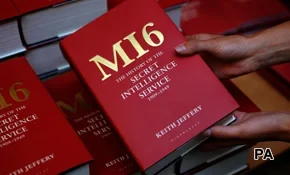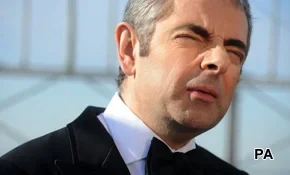By definition, the work of Britain’s security and intelligence services is a mystery to us. But how well do you think they are protecting the nation?
And do you suspect they are performing their role ethically or unethically? We explore your views...
In 1909, the British intelligence agencies MI5 (The Security Service) and MI6 (The Secret Intelligence Service) were formed to protect national security against threats from espionage, terrorism and sabotage, acting secretly overseas, ostensibly to make Britain safer and more wealthy.
British security and intelligence’s operations, and the individuals involved, are a recurrent source of speculation and interest – both positive and negative.
Last week, US media claimed that a British agent had played a key part in foiling an underwear-bomb plot in Yemen, and questions are still being asked as to MI5 and MI6’s role in the rendition of Abdel Hakim Belhaj, the head of Tripoli Military Council in Libya, in 2004.
To see what you had to say on the subject, we invited Labs panellists to share their views on Britain’s secret and security services.
From how well - from what you know or would expect– you perceive the services are managing to protect the nation; to how ethical or unethical their practises are, and, for some light relief, what comes to mind, from the realms of spy-fiction, when you think of ‘Her Majesty’s Secret Service’.
Despite the inevitable lack of knowledge around the services, the topic prompted some strong views in response.

Most of you said you suspected the intelligence services were protecting the nation well, in light of the relative lack of successful terrorist activity in Britain, and the nation’s Second World War victory.
Many participants took the ‘no news is good news’ approach, acknowledging that it is difficult to know exactly how well they are performing.
Over our question of whether you think the security and secret services are ethical or unethical in practise, responses were split, however.
- Interestingly, participants from both sides of the debate argued that ethical considerations may have to be overlooked in the interests of keeping British citizens safe - even if not always comfortable with how this might be achieved.
What do you think about the British Intelligence Services? From what you know, how well or badly do you think they have kept UK citizens safe? And how ethical do you suspect their practises are?
Join the discussion below.
Click on the headings below to see the range of arguments participants put forward...
1. Are they doing a good job?
Argument 1: YES, they seem to be
“I think we only get to know a very small part of what the British intelligence agencies achieve. Our country is still one of the safest in the world, and we have very generous civil liberties” Steve, Staffordshire

“No terrorist incidents recently, overall they are doing a very hard job very well. We never hear of their successes!” Simon, North Cornwall
“I think the intelligence services have done a very good job over the years at keeping Britain safe. Much of their work obviously goes unheard of, but I like to think that we're a safer society as a result of both domestic and international work by both services” Morgan, London
“Even with spectacular attacks and plots such as 7/7, how many other investigations are on-going and how many plots have been foiled? They are unsung heroes and the fact that we do not hear of their work, one can only assume they are doing a good job” Anon
“I don't exactly know what they do, I think it's supposed to be like that” Anon
“Well, we are all still here, couple of casualties along the way, but nobody is perfect” Mike, Wales
“Although there have been non-wartime terrorist attacks, the level and frequency of these attacks in comparatively minimal considering the controversial standing of Britain in the modern world” Kevin, London
Argument 2: NO, they don’t seem to be
“They spend too much time chasing non-existent threats, based on the intelligence agencies’ own prejudices, progressives, leftists, and peace activists. They are run by right-wing cranks” Anon, Lancashire

“We have seen a number of terrorist attacks in the past few years which they did not prevent” Anon
“They have too-narrow a focus – for example not responding quickly enough to the threat of the Germans in the inter-war years or the fundamentalist threat of the last 20 years” Barry C, Wolverhampton
“General incompetence and the publicity surrounding schoolboy-type elementary mistakes over many years” NC, Reading
“In my opinion, they have missed virtually every threat during times of world tension, and at the scarce times of world peace they resorted to stirring up trouble to justify their existence” Dee D, Yorkshire
“Their work keeps the working classes down both here and internationally and they work (in vain) to protect the Empire and British corporate power. It’s not about citizens; it’s about keeping the ruling class in power” Anon
2. Are they ethical?
Argument 1: YES, they seem to be
“They are doing a very difficult job in very trying circumstances. I would not like to have to make their choices” Ian, Great Yarmouth

“Ethics are inherent in British way of life and constitution” Danny
“They are managed and controlled by legislation; they have the same checks and controls as the police and require ministerial permission at the highest levels. There is no ‘carte blanche’ ability to do this – contrary to popular belief” Anon
“The British service seems to have much higher standards than most if not all others, even if it isn’t always to their advantage to do so” Gareth W, Preston
“There are things the security services have to do and on the whole I think they stick to the rules well. Occasionally there might be a case of an abuse of power but as this is usually counterproductive I think their training is to play by the book” A.S, Herefordshire
“There is a strict code of conduct, when breaches are found there are hearings” Anon
Argument 2: NO, they don’t seem to be
“The nature of the job is unethical” Anon

“Their job is to keep the British public safe and if that means acting unethically. Sometimes I think they do and even have a mandate to do so” Daniel E, Aberystwyth
“The country needs protecting, and I know that you can’t always achieve your aims in ethical ways” Ronnie H, Glasgow
“Investigative practices will, no doubt, sometimes cross the boundaries and innocent people's privacy will be invaded as part of an investigation, but I think this is a fair price to pay for our security” Anon
“There have been reports of abuses followed always by automatic denials” Anon
“They have a severe lack of accountability: 'national security' or the Official Secrets Act always obstruct attempts to hold them accountable” Jamie, Wales
“They seem to be a law unto themselves. The recent case of the man in the suitcase confirms this” Anon
What do you associate with British spies?
To many, any talk of ‘Her Majesty’s Secret Service’ will automatically call to mind the numbers 00 and 7, as well as super-gadgets, battling with baddies, and nip-and-tuck getaways.
Star of the novels and films, James Bond successfully paints a glamorous picture of what life as an undercover agent might be like. But Ian Fleming wasn’t alone in attempting to create an image of the services; there have been many other attempts to portray life as a spy...
Here we look at how our participants compared some fictional spies with the real deal…
Spooks, BBC series (2002-2011)
“It's about the British service. I am sure the writers have used their imagination but it was one of the best series the BBC has done” Anon
“It is a gritty drama based around fictitious events dealt with by MI5” Anon
“Seems fairly realistic if a little over-dramatised” Anon
“Although sensationalised, the show does do a good job at portraying the pressures and the behind-the-scenes nature, as well as giving MI5 a day in the limelight rather than the more glamorous MI6” Tom A, Doncaster
“Spooks uses a lot of real-life bases, including footage and political/diplomatic contexts. Its characters are broadly believable and, unlike James Bond, mortal” Anon
James Bond, Hollywood films (1953-2012)
“James Bond is everyone's favourite idea of a secret agent. In reality agents are grey men and women blending in unnoticed” Steve, Staffordshire
“Ian Fleming was involved with the SIS during WWII, as were some of his friends. The Bond books are based on these exploits – with a large dose of artistic license!” Danny
“Glamour, power, fast cars, surely that is exactly what MI5 and MI6 are like!”
“The name James Bond has been associated with MI6 for such a long time that it is hard for them not to be connected” Jamie, Wales
“I would like to think that James Bond is a pretty fair representation of the secret services, however I think it's a bit dirtier than that” Paul S, Leigh on Sea
Tinker Tailor, Soldier Spy (Book 1974, TV series 1979, Film 2011)
“It is realistic, complex and written by an ex-member of the intelligence service” Anon
“George Smiley is the anti-James Bond, and probably conveys a more realistic view of the works of MI6 during the Cold War” Andy, Stourbridge
“This is more archetypal of the British Intelligence Services, I expect. It seems realistically paranoid and with everything done on a shoe-string, with the American Services seen as another 'enemy' of sorts” Anon
“John Le Carre used to work for MI6, and his books were the first, I think, to reflect the ambivalence of the job and the shades of grey the agents have to deal with. It also differentiates between the MI6 officers and the agents on the ground” A.S, Herefordshire
“The cold war was a big issue for British Intelligence as it was riddled with Russian/Communist sympathisers in the 1970's” A.G, Derry
Johnny English, Hollywood films (2003, 2011)
“It's a great reminder that no one is infallible” Bri E, Hampshire

“British intelligence seems to be far from immune to bumbling and mishaps – even if they wish to be more like Bond or Smiley, their ability to bugger up operations and lose classified material is more Johnny English” Richard, Oxford
“It's what I'd like to think the British Intelligence services are like, for my own amusement. But I'm glad they're probably not like this. I tend to think of them more like this when in relation to America” Anon
“Because we are somewhat naive to what is actually happening” Anon
“Because, while it still over-estimates their level of competence, it is as close as we'll get” Dee D, Yorkshire

What do you think about the British Intelligence Services? From what you know, how well or badly do you think they have kept UK citizens safe? And how ethical do you suspect their practises are?
Join the discussion below

Follow and discuss: @YouGovLabs on Twitter






